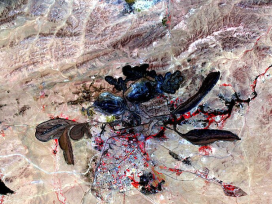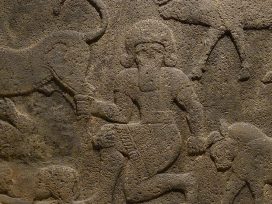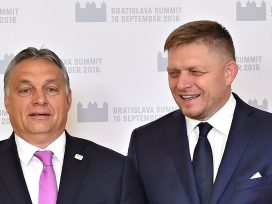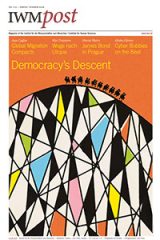

In collaboration with
Institute for Human Sciences
The Institute for Human Sciences / Institut für die Wissenschaften vom Menschen (IWM) is an independent institute for advanced study in the humanities and social sciences. Since its foundation in 1982, it has hosted more than 1500 scholars, journalists and translators from all over the world. Many of the Institute’s Permanent and Visiting Fellows are regular contributors to Eurozine or its focal points The World in Pieces and Ukraine in European Dialogue (see below).
Website: www.iwm.at
Twitter: @IWM_Vienna
Youtube: IWMVienna

Articles

Capitalism’s nervous breakdown
A conversation between Dessy Gavrilova and Albena Azmanova
Competitive labour markets, whether private or public, often set profit margins over employment rights. Job insecurity and new forms of exploitation are on the rise. As is the Far Right, cashing in on resultant worker anxieties. Is there a way out of this ‘precarity’, tormenting the overworked and underpaid?

Excitement over ‘rare’ elements
Julie Klinger in conversation with Misha Glenny
The race for green transition supplies is on. But where’s the thrill in metals, discreet and hidden yet widespread? Mining, intensive due to low concentrations, throws up waste elements like arsenic. Space cowboys and deep-sea dredgers contest environmental stability more than China’s monopoly, based on 40-years of involved processing. Health and recycling regulations are a must.

Literary expressions of grief across the ages use representations of nature as soothing metaphors. But rarely does the death of non-human life merit a thanatography. Could literature that finds a non-anthropomorphic means to grieve for other sentiment beings provide our desperately needed resensitization to the natural world?

Europe is facing not only Orbán’s autocratic turn but also that of his ‘apprentice’: Slovakia’s prime minister, Fico, has taken an advanced course in attacking his country’s judiciary, media and cultural institutions. His first goal: to get away with it, say beleaguered intellectuals, theatre directors, political scientists and investigative journalists from Bratislava.
Focal points

Inspired by a lecture that Clifford Geertz delivered in 1995 at the Institute for Human Sciences in Vienna, this focal point engages with ‘deep diversity’, ‘a sense of dispersion, of particularity, of complexity and of uncenteredness’ rather than unified world order. It follows the launch of a research programme of the same name at the institute in January 2023.

Post-revolutionary Ukrainian society displays a unique mix of hope, enthusiasm, social creativity, collective trauma of war, radicalism and disillusionment. With the Maidan becoming history, the focal point ‘Ukraine in European Dialogue’ explores the new challenges facing the young democracy, its place in Europe, and the lessons it might offer for the future of the European project.
Projects and publications

